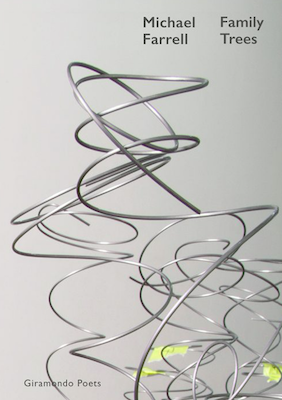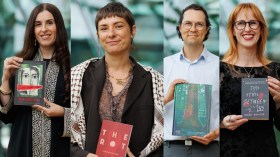Family Trees is an unusual poetry collection. Author Michael Farrell invites the reader into a richly drawn world grounded in animate settings and explored through a queer lens, reflecting a distinctive, often surreal writing style. Yet his work is striking in that it does not assert itself as being definitive. Rather, through his poems, Farrell repeatedly questions the very act of writing poetry and of positioning oneself in relation to one’s words. How are we looking at the world, the collection asks, and how might we see it differently?
On a surface level, Farrell’s poetry is interesting for the world it depicts. In this work, readers encounter everything from unemployed poets and Australian landmarks to personified native wildlife and a reimagining of Jesus where the sacred figure listens sceptically to Justin Timberlake songs. One never knows where the collection will travel next.
Moreover, Farrell’s poetry proves engaging owing to its specificity: these poems are Australian, they’re queer, they reference our culture and its shortcomings, and they’re vibrant and imaginative. Consequently, this collection succeeds by being so thoroughly connected to particular times and places that will be familiar to many Australian readers. It is refreshing to see one’s own environment depicted as being rich and storied, and Farrell’s work certainly contributes to Australian storytelling and culture in this way.
Another distinctive aspect of Family Trees is the lore interwoven with the poetry, such as in pieces like ‘Folktales Of The Avant-Garde’ and ‘Knitting A Poem By The Hoover Dam’. Farrell questions the mythologies of modern colonial Australian culture and seeks to create alternatives; ‘Knitting a poem for my nephew, so / He might climb out of any white life that’s made for / Him and his.’ Farrell offers alternative ways of seeing, drawn in significant part from his own experiences and family stories, as in his clever poems re-fabulating scenes from childhood visits to the South East Coast area of New South Wales. Indeed, the folkloric quality and focus on nature and memoir present in his poetry brings to mind some of Dorothy Hewett’s poetry, such as her Alice in Wormland collection (although Farrell is both more formally experimental and less notorious!). Farrell’s poetry frequently dabbles in the surreal and the irreverent, making it curious and memorable.
Granted, it merits noting that owing to this collection’s experimentalism and surrealism, it can be difficult to follow at times. While the imagery in the poems is often wonderfully evocative, it does not paint a picture that is easy to interpret, which may prove a barrier to some readers.
Nevertheless, this collection ultimately succeeds in a variety of ways, and not least because it is frequently thought-provoking. Pieces such as ‘Poet On The Monaro’ make evident Farrell’s wish to interrogate his own authority and truthfulness as a writer, with striking lines such as ‘I start wondering if it really is me writing, and whether the things I’m describing happened to me or to someone else.’ Farrell’s work explores the very performance involved in writing poetry and reimagining stories through either one’s own lens or that or someone else.
In short, Family Trees pushes its reader to take nothing as a given and instead reflect, question, and reconsider. An effective means of leaving a lasting impression!
4 stars out of 5 ★★★★
FAMILY TREES by Michael Farrell
Publisher: Giramondo Publishing
ISBN: 9781925818406
Format: Paperback
Categories: Poetry, Australian
Pages: 128pp
Release Date: April 2020
RRP: $24.00







